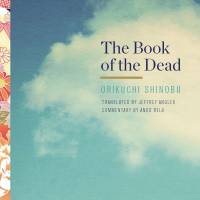Both influential and deeply mysterious, "The Book of the Dead" ("Shisha no Sho," 1943) is the most famous work of fiction by Shinobu Orikuchi (1887-1953), a pioneer of folklore studies in Japan and renowned poet. Orikuchi was fascinated with the origins of Japanese religion and the connections between spirit possession and the role of an emperor as a mediator between the gods and the Japanese people.
The Book of the Dead, by Shinobu Orikuchi, Translated by Jeffrey Angles.
352 pages
UNIVERSITY OF MINNESOTA PRESS, Fiction.
Inspired by the Egyptian myths of Osiris and Isis, "The Book of the Dead" is a short but complex web of interconnected narratives set in eighth-century Japan. The literary equivalent of a shining mandala, it transcends modern concepts of the novel and attempts to capture the mood and religious mindsets of the early Japanese nation.
The dense literary work is here accompanied by an erudite introduction by the translator, Jeffrey Angles, and some lengthy essays by Reiji Ando — Japan's leading Orikuchi expert — which discuss a wide variety of influences on Orikuchi, from lingering affection for deceased male loves to a fascination with Nestorian Christianity, and Orikuchi's involvement with the dizzyingly pluralistic New Buddhist movement of the early 20th century.
This is a difficult text to translate with artistic flare: Angles has produced a scrupulously researched book of academic rigor that is challenging for the general reader but stimulating for those who give it dedicated contemplation.


















With your current subscription plan you can comment on stories. However, before writing your first comment, please create a display name in the Profile section of your subscriber account page.